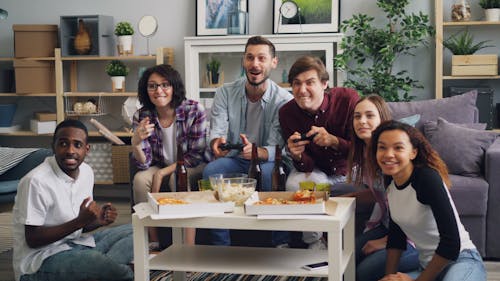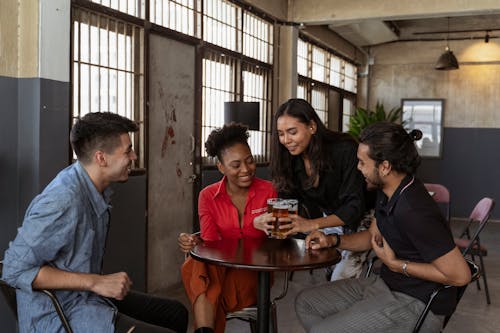
In today’s interconnected world, the ability to navigate social situations effectively is a vital skill. Imagine a life where making friends, collaborating with colleagues, or even navigating a casual conversation feels like scaling a mountain. While anyone can feel like they have challenges with social interactions, there are certain people who tend to report having more difficulty. Feeling connected to others in important for our health and happiness. So what exactly are social skills, and why are they so important?
What are Social Skills?
Social skills are the tools we use to interact and communicate with others in a positive and productive way. They encompass both verbal and non-verbal communication, including:
- Active listening: Paying close attention to what someone is saying and responding thoughtfully.
- Clear communication: Expressing yourself in a way that is easy for others to understand.
- Non-verbal cues: Using gestures and hand movements, using appropriate facial expressions, and having open body language.
- Empathy: Recognizing and understanding the feelings of others.
- Social awareness: Understanding social norms and expectations in different situations.
- Conflict resolution: Addressing disagreements in a constructive and respectful manner.
- Teamwork: Collaborating effectively with others to achieve a common goal.
The Importance of Social Skills in Everyday Life

Strong social skills are the bedrock of a fulfilling life. They allow us to:
● Build and maintain relationships: Social skills are the foundation of strong friendships, romantic relationships, and healthy family dynamics.
● Excel in the workplace: Effective communication and collaboration are crucial for success in most careers.
● Boost self-confidence: Feeling comfortable in social situations leads to greater self-esteem and a stronger sense of belonging.
● Increase happiness: Strong social connections contribute significantly to well-being and mental health.
● Navigate unfamiliar situations: Social skills equip us to adapt and thrive in new environments.
Benefits of Social Skills
The benefits of strong social skills extend far beyond personal satisfaction. Here are some specific advantages:
1. Academic Success
Students with good social skills are more likely to participate actively in class, ask questions, and build positive relationships with teachers and peers, all of which contribute to better academic performance.
2. Career Advancement
In the professional world, social skills are critical for building trust with colleagues, negotiating effectively, and leading teams. They can play a major role in promotions and career advancement.
3. Stronger Mental Health
Having solid social connections is a key factor in reducing stress, anxiety, and depression.
4. Increased Life Satisfaction
Strong social bonds lead to a greater sense of purpose, belonging, and overall life satisfaction.

Key Components of Effective Social Skills
Developing strong social skills requires a multi-faceted approach. Here are some key components:
● Active Listening: This is more than simply hearing what someone is saying. It involves paying close attention, giving verbal and nonverbal cues that you’re engaged (nods, smiles), and asking clarifying questions to demonstrate your understanding.
● Verbal Communication: This includes expressing yourself clearly and concisely, using appropriate language for the situation, and being mindful of your tone.
● Non-verbal Communication: This encompasses everything from eye contact and body language to facial expressions. Maintaining appropriate eye contact shows you’re engaged, while open body language projects confidence and approachability.
● Empathy: The ability to see things from another person’s perspective is crucial for building rapport and navigating conflict.
● Respect: Treating others with respect, regardless of their background or beliefs, is essential for positive social interactions.
● Adaptability: Be able to adjust your communication style and behavior to suit different situations and people.
Strategies for Developing and Improving Social Skills
The good news is that social skills can be learned and improved at any stage of life. While some people social skills easily, there are some people who feel like the want to interact successfully but have challenges. People who have ADHD, Non-Verbal Learning Disabilities, Anxieity, Depression, Social Communication Disorder or Autism often report that social interactions are a hard for them. How are social skills improved? Here are some strategies to get you started:
- Observe and emulate: Pay attention to people you find socially adept. How do they use body language? How do they actively listen?
- Practice active listening: Focus on truly understanding what someone is saying, rather than waiting for your turn to speak. Ask clarifying questions and paraphrase what you hear to demonstrate your attentiveness.
- Join a club or group: Engaging in activities around shared interests is a great way to meet new people in a low-pressure setting.
- Volunteer: Volunteering provides opportunities for social interaction and allows you to develop your communication and teamwork skills.
- Role-play scenarios: Practice conversations or situations that make you feel uncomfortable beforehand with a trusted friend or family member.
- Seek professional help: If you struggle with social anxiety or other underlying issues that may be hindering your social skills development, consider seeking help from a therapist or social worker.

Remember, developing strong social skills takes time and effort. Don’t get discouraged if you don’t see results overnight. Be patient with yourself, celebrate small victories, and focus on continuous improvement. In our increasingly connected world, navigating social situations with confidence is essential. At New Horizons Wellness Services, we understand the challenges some may face in developing strong social skills. That’s why we have developed treatment programs to teach social skills to many different age groups, including through our Counseling Services, Occupational Therapy Services, and dedicated social skills development programs.
We offer a variety of evidence-based programs—including social skills groups, individual therapy sessions, and virtual therapy—designed to help you build the tools you need for successful social interaction. From active listening and clear communication to understanding social cues and managing emotions, our experienced therapists can guide you on your journey towards stronger relationships, greater self-esteem, and a more fulfilling life. These services are available for all ages, with specialized care in pediatric occupational therapy and occupational therapy for adults, ensuring support is tailored to your unique needs.
Social skills are like any other skill – the more you practice, the more comfortable and confident you’ll become in social situations. With dedication and these strategies, you can unlock the power of connection and build a more fulfilling life.
You can view the current group schedule and contact our office by clicking here.

Frequently Asked Questions:
Why Are Social Skills Important for the Future?
Social skills are crucial for future success as they enable individuals to effectively communicate, collaborate, and build relationships in both personal and professional settings. As technology continues to advance, the ability to interact with others, empathize, and work in teams will remain essential. Social skills also foster emotional intelligence, which is increasingly valued in leadership roles and contributes to a positive work environment.
What Are the Effects of Lack of Social Skills?
A lack of social skills can lead to difficulties in forming and maintaining relationships, both personally and professionally. Individuals may struggle with communication, experience social anxiety, and face challenges in teamwork or collaboration. This can result in isolation, decreased job opportunities, and lower overall life satisfaction. In severe cases, it may also contribute to mental health issues like depression or anxiety.
What Is the Impact of Social Skills?
The impact of social skills extends across various areas of life. Strong social skills enhance communication, problem-solving, and conflict resolution abilities, making individuals more effective in their interactions. In the workplace, these skills can lead to better teamwork, increased productivity, and career advancement. Social skills also contribute to personal well-being, as they help build strong relationships, foster community involvement, and improve overall quality of life.
Yours in Health,
New Horizons Wellness Services13333 SW 68th Pkwy,
Tigard, OR 97223
- https://g.page/newhws
New Horizons Wellness Services provides a true multidisciplinary approach to mental & physical health treatments for children, adults and families.